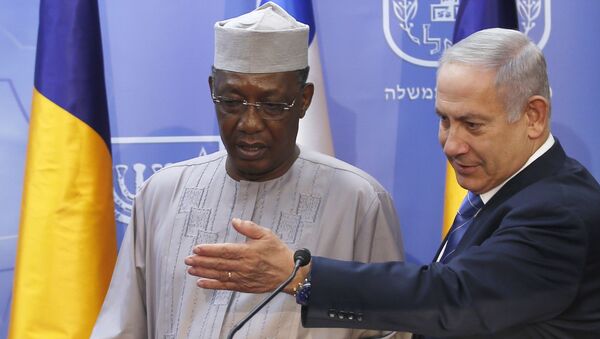It has been a year since Prime Minister Benjamin Netanyahu's historic visit to Chad, a predominately Muslim country that up until recently was hostile to Israel.
"There is a lot that we can do together," said the premier in a joint press conference with the Chadian president Idriss Deby in 2019. "...we discussed how to deepen our cooperation in every field beginning with security, but also agriculture, food, water, energy, health and many more".
One year down the line, things seem to be moving, albeit slowly.
"On the surface it might seem that nothing has been achieved but under the radar there have been several projects that we've set in motion," said Acheikh Ibn Oumar, a diplomatic advisor to President Deby, adding that since the re-establishment of formal diplomatic relations, visits of Israeli delegations have become frequent.
But that has not always been the case. Israel recognised Chad in 1960 when it attained its independence from France. Although diplomatic relations have been established shortly after, they were cut off in 1972 following the pressure of then Libyan leader Muammar al Ghaddafi, who believed that Israeli presence in Africa undermined the Palestinian cause.
Once Ghaddafi was gone, Netanyahu spotted an opportunity and seized it.
Major gains for Israel
For the Israeli premier, relations with Chad have been a big gain. Israeli airlines are now able to use Chad as stopover for flights to South America, saving time and cost.
Netanyahu has entered Israel's history books as a leader who expanded the country's presence in Africa, which is important in the diplomatic sphere. Israel has long felt that it is discriminated against on the international arena and specifically at the United Nations. In 2018 alone, the body has passed 27 resolutions; 21 of them condemned Israel and its conduct towards the Palestinians.
To change this trend, Israel needed to form a block of countries supportive of the Jewish state and Netanyahu turned to Africa to achieve this goal, visiting Uganda, Kenya, Rwanda and Ethiopia in 2016.
Win-win situation
Chad too seems to benefit from Israel's presence in the region. Suffering from desertification, lack of fresh water and locust swarms, the African country needs the Jewish state for its technology in the sphere of agriculture and water management.
But it also needs Tel Aviv for its military equipment when fighting terror. "We can certainly benefit from the experience Israel has when combating insurgents," explained Ibn Oumar.
In the south-west, Chad is facing an acute problem of terror emanating from Boko Haram, a terrorist group that has killed more than 30,000 people and displaced two million others since its insurgency in Nigeria more than ten years ago. The security threat has since spilled over to Lake Chad where militants stage frequent terror attacks.
It is because of terror that some elements in the Chadian public feared to have an open relationship with the Jewish state. But Ibn Oumar says convincing the general public that ties with Israel were crucial for the country's growth was not difficult.
"Although we initially faced some objection, the government made sure to explain its stance to the public. Open relations with Israel don't mean we are jeopardising the Palestinian cause. Quite the opposite: we will be able to use our good relations with both sides to mediate between them".
Ibn Oumar is certain that other African countries will not only understand the rationale behind the resumption of diplomatic ties with Israel but will also follow suit.
"In the past there has been a solidarity amongst African nations [that objected to the formalisation of ties with Israel]. However, when Egypt signed its peace treaty in 1979, the situation changed and many felt that they could do that too, especially now when the threat of terror is hovering above many African states".



